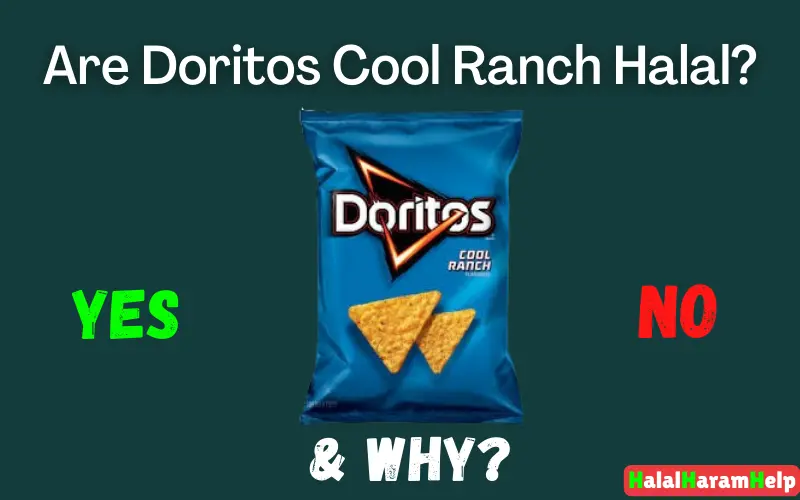When it comes to snacking, Doritos Cool Ranch is a favorite choice for many.
However, for those who follow a halal diet, it’s essential to know if their favorite snack aligns with their dietary restrictions.
This article aims to answer are Doritos Cool Ranch halal or haram, exploring the ingredients and manufacturing processes involved.
By providing clear and concise information, we hope to help you make an informed decision about enjoying this popular snack without compromising your dietary principles.

Are Doritos Cool Ranch Halal?
No, Doritos Cool Ranch is not Halal. This is because the ingredients used in Doritos Cool Ranch include cheeses made from enzymes and enzymes derived from pigs, which are not permitted in Halal foods.
Understanding whether a product is Halal involves looking at the ingredients and how they are sourced.
For Muslims who adhere to dietary laws, consuming Halal-certified products is essential if no clear information about ingredient sources. And, unfortunately, Doritos Cool Ranch does not meet these criteria.
The use of certain enzymes in the cheese and other flavorings renders the product non-Halal. These enzymes are often derived from animals, including pigs, which makes them unsuitable for a Halal diet.
Now, let’s dive deeper into the specific ingredients that make Doritos Cool Ranch haram and explain why these components are problematic for those following Halal dietary guidelines.
You might also like to know are Flamin Hot Doritos halal.
Ingredients And Their Sources
1. Corn: The primary ingredient in Doritos Cool Ranch is corn. While corn itself is Halal, it’s the additional ingredients and processing methods that raise concerns.
2. Vegetable Oil (Corn, Canola, and/or Sunflower Oil): These oils are generally Halal, but the concern lies in potential cross-contamination during processing.
3. Maltodextrin (Made from Corn): Maltodextrin is a food additive often derived from corn. Its source is generally considered Halal, but cross-contamination during production can be a concern.
4. Salt: Common table salt is Halal.
5. Cheddar Cheese (Milk, Cheese Cultures, Salt, Enzymes): The enzymes in cheese are the primary concern. These enzymes, often derived from animal sources like pigs, make the cheese non-Halal.
6. Whey: A byproduct of cheese production, whey is problematic if derived from cheese made with non-Halal enzymes.
7. Onion Powder: Generally Halal.
8. Corn Starch: Typically Halal.
9. Buttermilk: Similar to whey, buttermilk’s Halal status depends on its source and processing.
10. Dextrose: A sugar derived from corn, usually Halal.
11. Tomato Powder: Generally Halal.
12. Lactose: A sugar derived from milk, lactose itself is Halal, but the source of milk must be considered.
13. Artificial Color (Red 40, Blue 1): While artificial colors are typically Halal, they can sometimes be derived from non-Halal sources.
14. Monosodium Glutamate (MSG): An additive used to enhance flavor, generally Halal.
15. Sodium Caseinate: A milk derivative, its Halal status depends on the source of the milk.
16. Corn Syrup Solids: Generally Halal.
17. Natural and Artificial Flavors: The biggest concern for Halal consumers. These flavors can include animal-derived ingredients, including those from pigs.
18. Sodium Acetate: Generally Halal.
19. Spices: Generally Halal, but specific sourcing can be a concern.
20. Sugar: Typically Halal, but bone char used in processing can be an issue.
21. Garlic Powder: Generally Halal.
22. Skim Milk: Halal if sourced appropriately.
23. Citric Acid: Typically Halal.
24. Disodium Inosinate: Generally Halal, but often derived from meat or fish.
25. Disodium Guanylate: Similar to inosinate, its source can be a concern.
26. Red and Green Bell Pepper Powder: Generally Halal.
Also see is Takis halal.
Understanding Enzymes And Their Role
Enzymes are proteins that act as catalysts in various biological processes, including food production.
In the case of cheese, enzymes help in coagulating milk to form curds, which are then processed into cheese. There are different types of enzymes used in cheese-making:
Rennet: Traditionally, rennet is obtained from the stomach lining of calves. However, microbial and vegetable rennet are available and can be used as Halal alternatives.
Animal-Derived Enzymes: These are sourced from animals, including pigs, making them non-Halal.
Microbial Enzymes: These are derived from microorganisms and can be considered Halal if they are not genetically modified with non-Halal components.
FAQs
Q1. Do Cool Ranch Doritos have pork?
A: Yes, Cool Ranch Doritos contain enzymes derived from pigs, making them unsuitable for those avoiding pork.
Q2. Are Cool Ranch Doritos vegetarian?*
A: No, Cool Ranch Doritos are not vegetarian as they contain animal-derived enzymes.
You can also see are Red Doritos halal.
Conclusion
In conclusion, Doritos Cool Ranch is not Halal due to the presence of non-Halal ingredients such as enzymes derived from pigs.
For those adhering to a Halal diet, it is crucial to avoid these chips and opt for alternatives with clear Halal certification.
Always check ingredient lists and certifications to ensure compliance with dietary restrictions. Making informed choices helps maintain dietary integrity and aligns with personal beliefs.


